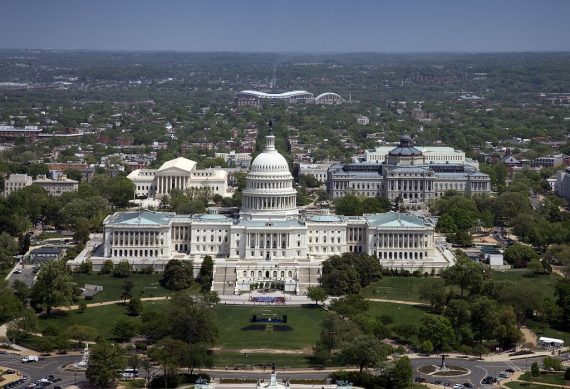Down-Ballot Republicans Campaigning As If Clinton Has Already Won
Republican candidates for the Senate and House are campaigning on the argument that they will be a bulwark against a Clinton Presidency.
In a sign that they see the writing on the wall, Republican candidates for the House and Senate are starting to campaign on the idea of being a bulwark against the potential excesses of a Clinton Presidency:
Republicans, desperate to salvage their congressional majorities amid Donald Trump’s collapse, are increasingly presenting themselves as checks on a Hillary Clinton presidency – a final argument that, if only implicitly, concedes the White House to Democrats.
The offensive, which has been under discussion for months and is only now being unleashed, is designed to win over voters who want to see Clinton’s powers curtailed – even as she closes in on a potentially sweeping national victory.
The message is taking different forms in different parts of the country. In Minnesota’s Iron Range, Republican Stewart Mills has begun airing a TV commercial that says his opponent, Democratic Rep. Rick Nolan, is “standing with Hillary Clinton, not Minnesota families.” Nolan, the ad says, “would give Hillary a blank check to run up trillions in new debt and job-destroying taxes.”
In upstate New York, the National Republican Congressional Committee has been running a TV ad that says a Democratic candidate, Kim Myers, would “fast-track” Clinton’s agenda in the House. It urges voters to support Republican Claudia Tenney – who will “stand up to Hillary Clinton.” Another spot warns that Myers and an independent candidate, Martin Babinec, would “rubber-stamp Hillary Clinton’s agenda in Congress.”
Republican Sen. John McCain, facing the toughest reelection fight of his political career, is taking a similar approach. Following his primary victory, McCain released a face-to-camera video in which he called his Democratic opponent, Ann Kirkpatrick, a “good person,” but added: “If Hillary Clinton is elected president, Arizona will need a senator who will act as a check, not a rubber stamp, for the White House.”
Elsewhere, the assault is less direct. In Missouri, for example, the Senate Leadership Fund, the main super PAC devoted to preserving the Republican majority in the upper congressional chamber, is out with a spot detailing the “many ways” Democratic candidate Jason Kander “is just like Hillary Clinton” — while showing Kander’s face morphing into hers.
“One Hillary in Washington would be bad enough,” it concludes.
It’s an approach that hasn’t gone into use since 1996, when Republicans, confronting an inevitable loss in the presidential race, aired blank-check ads warning of the perils of handing then-President Bill Clinton Democratic majorities in Congress. “What would happen if Democrats controlled Congress and the White House?” one NRCC commercial that year asked gloomily.
It worked: While Republican Bob Dole lost to Clinton in a landslide, the party maintained its hold over the House and Senate. The strategy went into effect in late October of that year — nearly 20 years ago to the day.
More is on the way. Later this week, Congressional Leadership Fund, the main super PAC charged with protecting the House GOP majority, is slated to begin airing a TV commercial in Central Michigan accusing a Democratic candidate, Suzanna Shkreli, of being a Clinton rubber stamp.
The NRCC, the House GOP’s campaign arm, is urging others to get involved. While it can’t legally coordinate with outside groups, it can communicate to them through public means. The committee recently updated an opposition research Web page on Montana Democrat Denise Juneau, noting that she has enthusiastically backed Clinton’s presidential bid. “Juneau supports Hillary Clinton and would be a blank check if Clinton were to become president,” the website declares.
(…)
Not all Republicans love the new approach. Some GOP strategists say Clinton’s poll numbers have improved amid Trump’s free-fall, making a check-and-balance message less palatable. Others say it risks angering Republican voters who don’t want the party to throw in the towel.
Still others say it’s a hard case to prosecute with so little time remaining until the election — and that it’s better to establish contrasts with Democrats.
“A check-and-balance message can help, but has limits,” said Robert Blizzard, a GOP pollster who is working on a number of down-ballot contests. “The most efficient, effective way to stop voters from supporting your opponent is to tell those voters how bad your opponent is and why they’d be a poor choice. Voters want to know who will be better for them and their families, not who will be better at standing up to Hillary Clinton.”
Given the current status of the polls, it’s an understandable strategy. With the exception of solid red states where re-election was already a foregone conclusion, candidates who find themselves closely associated with the Trump campaign the closer we get to Election Day could find themselves in something of a bind if voters decide to punish the GOP as a whole for Trump’s obvious deficiencies. Indeed, for some time now many down-ballot candidates have been campaigning without any real regard for the top of the ticket, and most of them have refused to comment on whatever Trump’s most recent tirade may have been. It’s a strategy that has seemingly worked quite well for candidates such as Rob Portman in Ohio and Marco Rubio in Florida, for example, both of whom are leading their respective races by margins that seem comfortable enough to able to say that they’ll probably survive November 8th. Other candidates, such as Mark Kirk in Illinois, Ron Johnson in Wisconsin, and Kellie Ayotte in New Hampshire haven’t been so lucky and face much tougher fights for re-election. Additionally, while the odds of the GOP losing the House seem slim for a wide variety of reasons, there are a number of members of the House of Representatives who are potentially vulnerable to anti-Trump blowback, especially in states that are likely to go strongly for Hillary Clinton in November.
All that being said, one does have to admit that it’s striking to see the party taking this road with just two weeks left in the campaign. For one thing, it’s typically only a strategy that any political party typically only employs when running against a popular incumbent, not in a situation where both parties are competing for what is ostensibly is an open seat. As I’ve remarked before, though, it’s long been the case that Hillary Clinton has seemed more like an incumbent during various parts of this election, and this is certainly one of them. However you characterize her, though, with the signs increasing that the Presidential election is all but over, the idea of Republicans using the idea of an impending Clinton Presidency to rally supporters makes sense under the circumstances. Whether it will work is another question.







One reason: Gerrymandering. Dems have to win overall House vote by 5% to take control over chamber. At some point, the Constitutionality of the extreme gerrymandering has to come into play.
(And yes, both sides gerrymander but its more on the GOP at this point b/c of the way population and state houses was controlled/spread in 2010)
For weeks the D’s election materials in my mailbox show every republican candidate side by side with Donald Trump. He is poison and I’m glad to see the Democrats playing hard ball.
Colin Powell, who had been on the fence, endorses Clinton.
@SKI: Yeah, gerrymandering is the only thing saving the house for the GOP. Granted, the GOP has a built in advantage when it comes to the house/senate seats in off year just on the bases of demographics. But the current setup is insane, there is a a chance Clinton wins by 8-10 points and the Democrats still come up 5-10 seats short in the house.
And an 8-10 point win for Hillary is a wave election.
For some reason I am seeing visions of rats and sinking ships. Not sure why that comes to mind.
For some reason I am seeing visions of rats and sinking ships. Not sure why that comes to mind.
Gerrymandering is an issue but it’s not the biggest reason the GOP has a structural advantage. They poll better in large rural districts and suburbs. Democrats dominate in cities which means their voters are very concentrated geographically. Unless you start drawing crazy districts to take that advantage away (like Maryland did), the GOP will always have an advantage in House elections.
Frankly, the Democrats are in a glass house on this one. They are perfectly happy to gerrymander their own states. I grew up in a Georgia that was controlled by Democrats and gerrymandered to hell. And in California, they now have an open primary which means many state races are now a competition between two Democrats. The main reason gerrymandering favors the GOP right now is because the GOP controls most of the state houses. That doesn’t excuse it, but this really IS one of those “both sides do it” things.
Kelly Ayotte, the incumbent Republican senator in New Hampshire, was running one point behind Maggie Hassan, her Democratic opponent, until Hassan ran an ad that featured Ayotte describing Trump as a “role model.”
Hassan immediately gained another seven points over Ayotte.
The Trumpkins are so demented, however, that they seem to think that President Trump, working with a Democratic senate and house, will be able to negotiate “great deals” with Schumer and Pelosi. You know, they’ll agree to build the wall, dump NATO, and expel all the Mexicans and Muslims.
@Hal_10000: Very true, re: urban gerrymandering.
Texas’s 35th District dilutes the representation of both Austin and San Antonio.
When I lived in Austin, I lived on the far western edge of Texas’s 17th Congressional District. When I moved 100 miles to the east in 2013, to Bryan, Texas, I was still living in the same district.
And the 10th Congressional Distirct is drawn the way it is for an absolutely shameful reason. It extends from the western suburbs of Austin all the way east into Houston (3 hours by car) for one purpose and one purpose only. The incumbent (Michael McCaul, son-in-law of Dell Computer founder Michael Dell, and the 2nd wealthiest member of the House) lives in the most expensive suburb of Austin (West Lake Hills) and doesn’t want to move.
@Hal_10000:
I see this argument frequently, from prominent pundits and political scientists. But it isn’t valid. Cities can be split. My home city, Cincinnati, is. It was done to dilute the city’s vote with a lot of Republican suburbs and create two safe Republican districts, OH-1 and -2. Easy enough to draw a cartogram with equal areas representing equal populations and use it as a redistricting map. Then concentration doesn’t enter into it.
True, that. For once both sides do do it. Part of this comes from southern Dems collaborating with GOPs to draw a few safe black districts. Seems like this should make it easier to get everybody to agree to a solution. Saw an article this morning that Canada’s done well with non-partisan redistricting commissions.
@Hal_10000:
Actually California has a non partisan commission drawing the districts.
Heh, look at this:
When I saw that, I thought: “Surrogates assemble!”
@JR: @SKI: It isn’t just gerrymandering, and may not even be primarily gerrymandering (but it does matter). The main issue is the geographic sorting that takes place in our single seat district system that inherently favors the Republicans.
See:
*Not Gerrymandering, but Districting: More Evidence on How Democrats Won the Popular Vote but Lost the Congress
*Political Geography and 2012 U.S. House Vote
* Distortions of the US House: It’s not how the districts are drawn, but that there are (single-seat) districts
(or put another way, our system to elect the House disadvantages the party whose strength is primarily urban)
@Steven L. Taylor: sure, there are some inherent advantages to the rural party given that some states don’t have enough population to justify the one seat they get and how we break ties for state representation overall BUT seats are assigned in proportion to census population. If done “clean” a rural voter in upstate NY shouldn’t have more voting weight from a voter in NYC. Put another way, there is no way, absent gerrymandering that there should be a huge weighting towards the rural party. Some? Yup but not more than a handful of seats.
@SKI: All I can say at the moment that the political science is pretty clear: our system of electing the House in particular advantages Republicans and it would do so even if the districts were drawn in a more politically neutral fashion.
And I understand this may not be obvious or clear.
We also don’t have enough seats in the House, which also contributes to the problem.
How about this: voters are not ideologically evenly distributed, so even neutrally drawn districts will capture distortions that result from self-sorting.
How’s her head?
OT, but KFF report on Obamacare 2017 increases is interesting particularly as it applies to the ACTUAL NET cost for the typical subsidized enrollees.
@gVOR08:
TBF: there were requirements from civil rights laws to create majority-minority districts so that black politicians would have a better chance of being elected. But yeah, it became a baptists and bootleggers situation, where both sides were happy to gerrymander.
@Bob@Youngstown:
Uh-oh. We need to clean this up……..
@Guarneri: More facts and data than being proffered by Trump campaign.
@Hal_10000: While states have traditionally run elections under the Constitution, I think a “good government” idea would be to pass a constitutional amendment that gives Congress the power to draw congressional districts. These are federal, not state, offices.
@Guarneri:
How you gonna clean it up…oh…thats right…after 6 years you still have no workable ideas…except to turn your back on the sick and poor and elderly.
@Bob@Youngstown:
John Podesta, actually. But, you know, I didn’t learn about any of this until I saw it in the news, like you. Snicker.
@Guarneri:
You know you are a piece of work…The last administration was going around outing spies and lying us into war and committing war crimes and ignoring Enron and crashing the economy…and you say nothing.
Now you are supporting someone who has admitted to serial sexual assault.
But you’ve got your bowels in an uproar over this Podesta e-mail?
What a fwcking maroon…
@SC_Birdflyte: But that would replicate the problem: a partisan body drawing the lines.
Now, the notion that lines ought to be drawn by a non-partisan commission is a step in the right direction.
@Steven L. Taylor: I get the concept: that urban voters are more intensely Democrat than rural voters are GOP.
I question whether that, of necessity, means that the GOP-inherent edge in district drawing is such that it over-rides millions of votes. Surely we can draw rational districts that better reflect the preferences of the population writ large.
@Guarneri:
Well, it’s ahead by 5 to 7 points if you believe the polling.
@Steven L. Taylor: Actually, what I had in mind under said constitutional amendment would be for Congress to set up such a commission. I fear we shall have to wait for Santa Claus or the Easter Bunny to deliver said amendment.
@SC_Birdflyte: Santa or the Easter Bunny might deliver it, but an amendment taking power away from state legislatures isn’t likely to have legs.
@al-Ameda:
People like Guarneri don’t believe the polling. They only believe their emotions. Which is scary considering he claims to be a crack businessman…just like Trump. Oh wait…Trump lost money in the Casino biz…where the house always wins. Well I guess that explains why Guarneri is always wrong about everything he claims.
@SKI: “Surely we can draw rational districts that better reflect the preferences of the population writ large.”
If you start from the assumption that “the population’ has one overall set of preferences, maybe you can. In a society where the party-line divisions are writ as large as they are in the US, maybe not. In a society where 40% of the population will vote for Donald Trump, there may not even be anything that represents “the preferences of the population writ large.”
@Electroman: Well, we do have the 17th Amendment, but that was 103 years ago…
Real Clear Politics polling average has Hillary up by 4.4%.
http://www.realclearpolitics.com/epolls/2016/president/us/general_election_trump_vs_clinton-5491.html
Oh, and that ABC poll that had Hillary up 12? It’s now down to 8, but I got $5 that we won’t see a story “Trump cuts Clinton’s lead by 1/3rd in just one day.”
Mike
@MBunge: Keep hope alive, right? Trump could still win!
@MBunge:
And Clinton’s lead in that Reuters/Ipsos poll you seem to love is now 6 points.
Personally, I think the people writing on the blog know enough about margin of errors to not write your story nor a story about “Clinton’s lead now up by 50%”…
@PJ: I was about to make basically the same observation, except with a reference to confidence intervals.
The Senate Should Refuse To Confirm All Of Hillary Clinton’s Judicial Nominees
by Ilya Shapiro
“As a matter of constitutional law, the Senate is fully within its powers to let the Supreme Court literally die out.”
At some point, “Reasonable Conservatives” need to stop supporting the Treason and Destruction Party.
I am very much a don’t count your chickens-type, and this type of talk is starting to make me nervous. Two polls came out today: Trump leading in FL, and much closer in NH than he has been (within 4 pts. now). I know and understand the math, but jeez, if Dems start thinking this is in the bag, some of them won’t bother voting (this is especially the case for younger voters).
@Jen:
That will depress more votes for the candidate seen as losing than the candidate seen as winning.
People like to vote for a winner, on the other hand, if the candidate is going to lose, why bother, it won’t change anything.
@PJ:
That’s what the GOTV effort is for.
Something Trump stopped funding earlier this week.
@PJ:
@C. Clavin:
Okay, thanks. I still think I’ll likely be on pins & needles for the next two weeks. I really, really would prefer a blowout over a squeaker.
@dxq: I too noticed that article earlier today…I’d be curious if any of the hosts of this blog will write about that…the idea that the Senate would simply refuse to hold hearings and a vote for any SCOTUS nominees for years is unbelievable…a complete dereliction of duty…I wonder if something like that went on long enough, could a future president challenge such a radical policy in court…
@An Interested Party: The general public, who unlike us, quite sensibly don’t really follow politics, are unaware of how asymmetric government dysfunction is. They do not see the pervasiveness of Republican obstruction. And the supposedly liberal both-sides-do-it main stream media aren’t about to tell them. It’ll be hard to hide if they either refuse to vote on nominees or vote down mainstream, widely respected, non radical nominees. Like, say, Merrick Garland.
The really head-scratching thing about the refusal to consider court appointments is that currently, the lower courts have more Obama appointees. In 4-4 SC decisions, the lower court rulings stand–which will have the effect of a liberal court anyway, won’t it?
There was already one case (I think it might have been Dow?) where the company decided to settle rather than moving forward with the case due to the current uncertainty. Contrary to what Republicans seem to think, this isn’t going to work well for them, or the pending cases.
It won’t create precedents which is the real danger for the conservative side. As it is, each litigant would have to sue to the court of appeals instead of getting sustained in lower courts based on existing case law.
Today Trump announced that he’s going to spend $100 million on his campaign. Setting aside the fact that much of this is in the form of loans, and that much of that spending is at his own businesses, one question strikes me above all others:
Why would he invest $100 million into a ‘rigged’ election?
Significant blog post a lot of insite thank you for the write about.